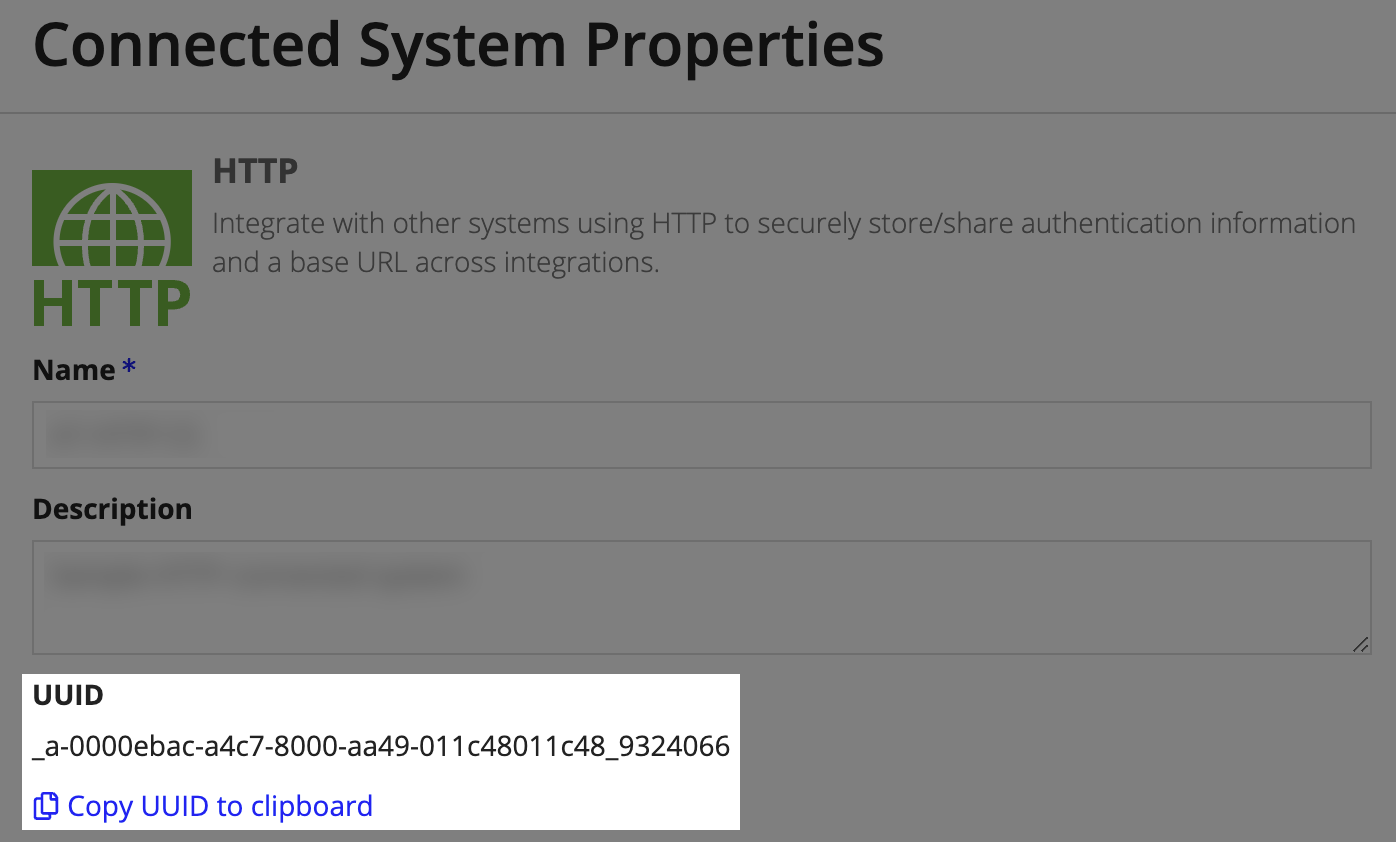OverviewCopy link to clipboard
This endpoint updates a connected system's properties in an Appian environment. With this endpoint, you can integrate with a secrets management tool to update credentials or make other changes to the connected system object without needing to sign in to Appian.
- Header:
Content-Type: application/json - HTTP Request Method:
PATCH - Endpoint:
/connected-system-management/v1/connected-systems/<UUID>
WorkflowCopy link to clipboard
Complete the following steps to update a connected system's properties using this endpoint.
- In Appian, navigate to the connected system object.
- In the Connected System Properties, click Copy UUID to clipboard.
- Invoke the endpoint using the copied UUID.
Note: Connected system UUIDs are also available in the import customization file generated when you export the application.
RequestCopy link to clipboard
Each PATCH request’s body must include a JSON object (application/json content type). The JSON object is a list of key-value pairs, each a connected system property and its new value. Only the properties included as parameters are updated.
JSON object parametersCopy link to clipboard
The parameters you can pass to the endpoint vary depending on the type of connected system you are updating.
The properties you can update with this endpoint are the same as those that can be set in the import customization file. See the individual connected system pages for the list of the allowed parameters.
- Amazon Machine Learning
- Blue Prism
- Custom JDBC
- Data Source
- DocuSign
- Google Cloud Natural Language
- Google Cloud Translate
- Google Cloud Vision
- Google Drive
- Google reCAPTCHA
- HTTP
- Microsoft Azure LUIS
- Microsoft Dynamics 365
- OpenAPI
- Salesforce
- SharePoint
Request exampleCopy link to clipboard
The following example shows a username and password update for an HTTP connected system using Basic authentication.
Request
1
PATCH /connected-system-management/v1/connected-systems/<UUID>
Copy
JSON object example
1
2
3
4
{
"username": "system.read.svc",
"password": "46hvase5ru6dsa",
}
Copy
cURL example
If you’re calling the API from a command line interface, you can use cURL to make a request. The cURL command with the above JSON object and its corresponding files looks like:
1
2
3
4
5
6
7
8
curl --location --request \
PATCH 'https://mysite.appiancloud.com/suite/connected-system-management/v1/connected-systems/<UUID>' \
--header 'appian-api-key: <API key>' \
--header 'Action-Type: import' \
--form json='{
"username": "system.read.svc",
"password": "46hvase5ru6dsa",
}' \
Copy
ResponseCopy link to clipboard
Successful responseCopy link to clipboard
| Attribute | Value |
|---|---|
| resource | The connected system object that was updated |
| message | A string indicating that the update succeeded |
Response exampleCopy link to clipboard
1
2
3
4
{
"resource": "/suite/connected-system-management/v1/connected-systems/_a-0000eb95-35b3-8000-9fa4-011c43211c48_7519",
"message": "Success"
}
Copy
ErrorsCopy link to clipboard
The following table describes errors you may encounter when using this endpoint.
| Error code | HTTP status code | Description | Example |
|---|---|---|---|
| APNX-1-4504-004 | 400 | One or more fields referenced in the request body are invalid | For an HTTP connected system using API Key authentication, attempting to update the non-existent username field results in this error |
| APNX-1-4504-011 | 400 | The provided UUID does not match a connected system object | For a connected system with a UUID of _a-0000eb95-35b3-8000-9fa4-011c43211c48_7519, using any other value in the request URL results in this error |
| APNX-1-4504-016 | 400 | The request body is empty or the JSON object is malformed | The following JSON object is malformed, so using it in the request body results in this error: {"username": "system.read.svc, "password": 46hvase5ru6dsa} |
| APNX-1-4187-000 | 401 | The provided credentials are invalid | An expired access token is included in the request resulting in this error |
| APNX-1-4188-003 | 401 | The service account associated with the provided access token or API key is not in the service account system group or the service account does not have editor permission for the connected system object | The connected system's security does not allow service accounts to edit the object |
| APNX-1-4504-017 | 415 | The request body's content type is invalid. The only supported content type is application/json |
A request including a Content-Type: form-data header results in this error |
| APNX-1-4504-018 | 404 | An incorrect endpoint was specified or the request refers to an invalid connected system UUID | Making a request to an invalid endpoint, such as /connected-system-mgmt/v1/connected-systems/<UUID>, results in this error |
| APNX-1-4504-020 | 405 | The request was made with an invalid HTTP method. PATCH is the only method allowed with this endpoint |
A request made with the DELETE method results in this error |


